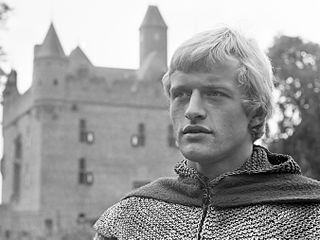
Floris is a 1969 Dutch action television series starring Rutger Hauer and Jos Bergman, written by Gerard Soeteman, and directed by Paul Verhoeven.
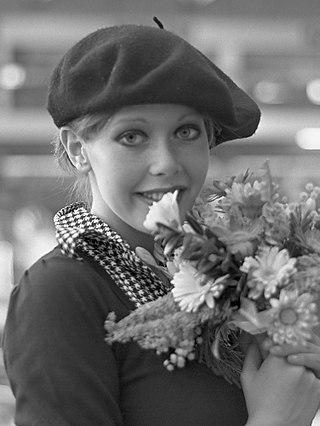
Sylvia Maria Kristel was a Dutch actress and model who appeared in over 50 films. She is best remembered as the eponymous character in five of the seven Emmanuelle films, including originating the role with Emmanuelle (1974).

George Gaynes was a Dutch-American singer, actor, and voice artist. Born to Dutch and Russian-Finnish parents in the Grand Duchy of Finland of the Russian Empire, he served in the Royal Netherlands Navy during World War II, and subsequently emigrated to the United States, where he became a citizen and began his acting career on Broadway.

Cinema of the Netherlands refers to the film industry based in the Netherlands. Because the Dutch film industry is relatively small, and there is little or no international market for Dutch films, almost all films rely on state funding. This funding can be achieved through several sources, for instance through the Netherlands Film Fund or the public broadcast networks. In recent years the Dutch Government has established several tax shelters for private investments in Dutch films.

Johan Heinrich (Joop) Doderer was a Dutch actor, well known for his role as the tramp Swiebertje in the eponymous television series. The series ran for 17 seasons between 1955 and 1975, and was broadcast by the NCRV. Besides the role of Swiebertje, Doderer played in dozens of radio and television programs, played the role of Alfred Doolittle in My Fair Lady, acted in Dutch and English movies, and appeared on stage in comedies, musicals, cabaret and dramas.
Dutch comics are comics made in the Netherlands. In Dutch the most common designation for the whole art form is "strip", whereas the word "comic" is used for the (usually) soft cover American style comic book format and its derivatives, typically containing translated US superhero material. This use in colloquial Dutch of the adopted English word for that format can cause confusion in English language texts.
Joop ter Heul is a fictional character in a series of five books written for teenage girls by Dutch novelist Setske de Haan (1889-1948), who wrote under the pen name Cissy van Marxveldt. Joop is high-spirited, headstrong, and stubborn. The first four books, published from 1918 to 1925, deal with her high school years, her young adulthood, her marriage, and her sons. The last book was not written until more than twenty years later. The initial four books are remembered today for being a strong influence on diarist Anne Frank, both in the character of Joop, whom she identified with and in the epistolary style in which the books were written, which she adapted for her diary.

Adrianus Marinus Kyvon, known by his stage name André van Duin, is a Dutch comedian, actor, singer-songwriter, author, television presenter, television director, television producer and screenwriter. Van Duin is one of the Netherlands' best known entertainers, with a career spanning almost six decades.
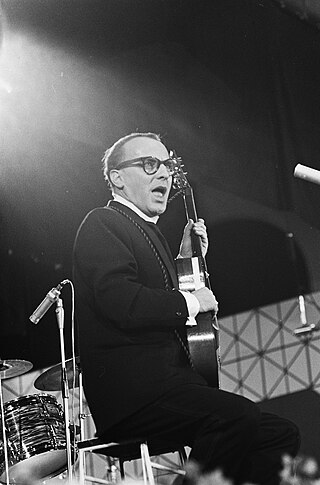
Willem "Wim" Sonneveld was a Dutch cabaret artist and singer. Together with Toon Hermans and Wim Kan, he is considered to be one of the 'Great Three' of Dutch cabaret. Sonneveld is generally viewed as a Dutch cultural icon for his work and legacy in theatre, musicals and music.

Little Crumb is a 1999 Dutch film written and directed by Maria Peters, based on the 1923 novel by Chris van Abkoude. The film was produced by Shooting Star Filmcompany and KRO. it was released in the Netherlands on December 23, 1999, by Buena Vista International.
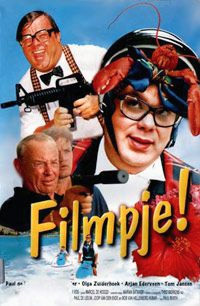
Filmpje! is a 1995 Dutch comedy film directed by Paul Ruven. It stars Dutch TV presenter and comedian Paul de Leeuw as two of his characters, Bob de Rooy and his wife Annie de Rooy, which were both featured in a lot of his TV sketches. Just like De Leeuw's TV shows the film is full of controversial comedy about taboo subjects. It was the most popular Dutch film of the year.
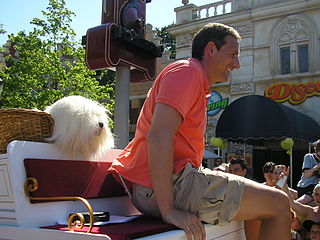
Samson & Gert is a Flemish children's television series produced by Eline van Noppen, centered on the talking dog Samson and his owner Gert. In its entire run, the show was originally aired on TV1 from Christmas Day 1989 until 1 December 1997, where it moved to Ketnet and continues airing all of its episodes to this day.
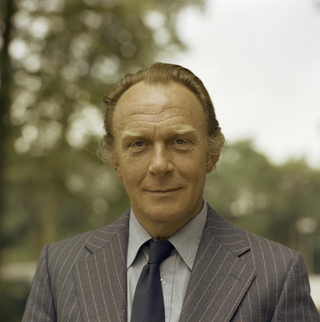
Kees Brusse was a Dutch actor, film director and screenwriter. A self-taught actor, he was remarkable for his natural acting style at a time when more theatrical performances were the norm in The Netherlands. One of the first Dutch actors who managed to combine a stage and film career with a career on TV, radio and in commercials, he appeared in 47 films and television shows between 1936 and 2004, including Pension Hommeles (1957-1959), Ciske de Rat (1955), and Dokter Pulder zaait papavers (1975).
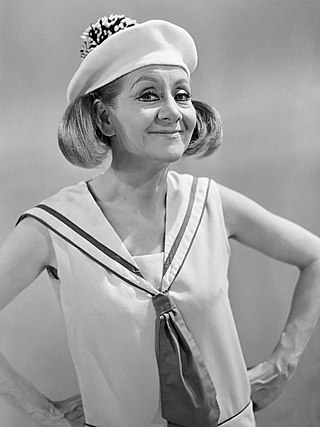
Conny Stuart, pseudonym of Cornelia van Meijgaard, was a Dutch actress, singer, and cabaretière.

Jan Hendrik (John) Kraaijkamp Sr. was a Dutch Golden Calf and Louis d'Or winning actor, comedian and singer. For years, he formed a comedy team with Rijk de Gooyer. One of The Netherlands' most popular comedians, praised for his perfect timing, he also played in more serious plays, including the title role in King Lear (1979) and in the Academy Award-winning WWII drama film The Assault (1986). From 1993 until 2003, he starred in the successful sitcom "Het Zonnetje in Huis" along his son John Kraaijkamp Jr.

Pleuni Touw is a Dutch film, television and theatre actress best known for her role in the 1974 miniseries De Stille Kracht, which featured the first televised nude scene in Dutch history.

Q & Q was a Dutch television series, broadcast by the Katholieke Radio Omroep (KRO) in 1974. With an average audience of three million viewers, the show is one of the highest-viewed programs in the history of Dutch television.

Barend is weer bezig was a Dutch television show written and directed by Wim T. Schippers with Wim van der Linden, Gied Jaspars, and Ruud van Hemert and broadcast by the VPRO in 1972-1973. The show was produced by Ellen Jens. Four regular episodes and a Christmas special were made. The series caused considerable controversy, particularly because of a scene in which the then-reigning Queen Juliana of the Netherlands was mocked.

Arjan Ederveen Janssen is a Dutch actor, comedian, TV scriptwriter and TV director. He participated in the TV series Theo en Thea, Kreatief met Kurk and 30 minuten and played in the musicals Hairspray and Lang en Gelukkig. He wrote the play Moord in de Kerststal. Ederveen owns a TV production company, called De Toko. His manager is Evelien Jansen.
Celebrity comics are comics based on the fame and popularity of a celebrity. They are a byproduct of merchandising around a certain media star or franchise and have existed since the mass media and comics came into existence in the 19th century. Celebrity comics are usually not held in high esteem by critics, because of their purely commercial nature. They are solely created to capitalize on media trends and therefore published so quickly and cheaply that drawings and narratives tend to be of very low quality.

















